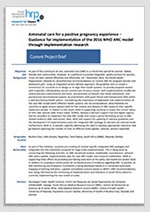A66006: QUALIty DECision-making by women and providers for appropriate use of caesarean section: hybrid effectiveness-implementation type III trial
HRP Project Brief

Overview
While a caesarean section (CS) are a life-saving intervention when medically justified, an increasing number are performed without medical reasons in low- and middle-income countries (LMIC). As with any surgery, CS are associated with short- and long-term risks which are higher in women with limited access to comprehensive obstetric care. In addition, unnecessary CS diverts scarce resources and thereby reduces access to healthcare for women in need.
Argentina, Burkina Faso, Thailand, and Viet Nam are committed to reducing unnecessary CS, but individual and organizational factors in healthcare facilities prevent this aim. Non-clinical interventions can help to overcome these barriers by assisting providers to adhere to evidence-based practices and supporting women’s decision-making regarding childbirth. Existing evidence has shown only a modest effect of single interventions on reducing CS rates, arguably because of the failure to design multifaceted interventions targeting all the stakeholders involved, and effectively tailored to the context. The aim of this study is to design, adapt, and test a multifaceted intervention for the appropriate use of CS in Argentina, Burkina Faso, Thailand, and Vietnam.
